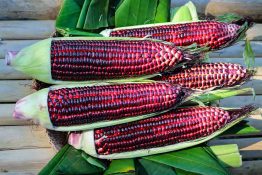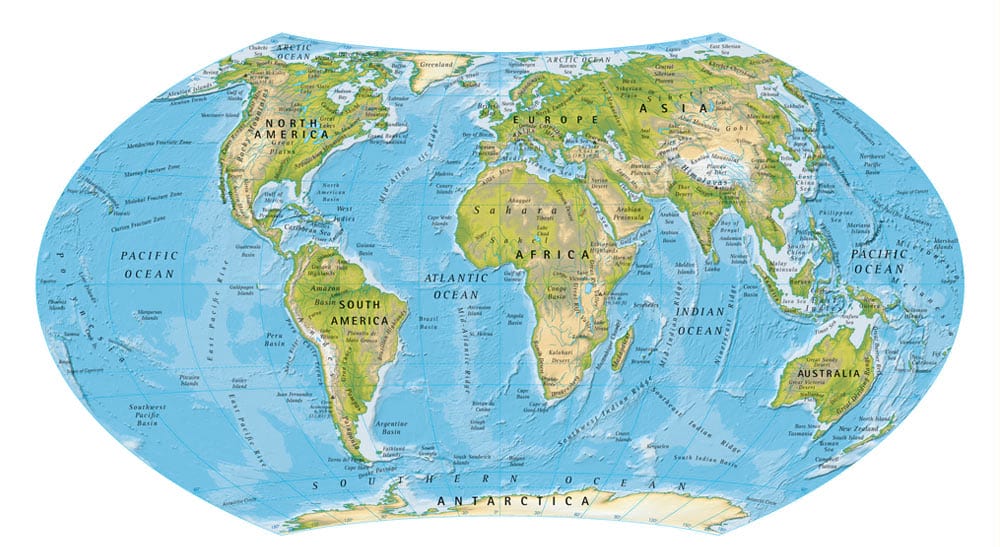By MACROS | Published on July 22, 2017
The all-American diet might not be maximizing your health. Employ these eating habits from around the globe to make sure your nutrition is always on top of the world.
South America
From the continent that gave the world super foods like quinoa, acai berries and amaranth, the South Americans’ cooking styles are heavily influenced by Spanish, African and Portuguese cuisine.
While each country has its own distinct food tastes, there remains one constant: maize. It’s often mixed with beans, meat and some kind of salad. Maize is made from corn, yet something we don’t see much of is purple corn.
Research in AJP: Renal Physiology found that it’s rich in flavonoids, which are reported to have anti-diabetic properties and the ability to help keep your kidneys healthy. Whether you’re trying to lose weight or bulk up, this type of corn is worth including in your diet.

Antartica
You unknowingly eat this continent’s national cuisine daily: ice. Why is this relevant? Well, there’s been a plenty of debate about whether or not cold water actually burns more calories, but it’s what the science says that counts. The most recent study done, in 2008 by the Oakland Research Institute, found that drinking a liter of ice-cold water every day for a year made people burn 5lb of extra fat.
This was mirrored in another study at Humboldt University, Germany, so it’s safe to say icy water can have a marginal effect, but it’s not exactly huge. Still, if you want to get lean, every little sip helps.
Africa
With less processed foods eaten, the dietary habits of the Dark Continent hold a secret that’ll aid your digestive system. A study in Nature Communications compared a Western diet, that was high in protein and fat but low in fiber, against African diets, which were high in fiber and low in fat and protein.
They found that when Westerners ate African diets for two weeks they significantly reduced their risk factors of colon cancer. While there’s no surprise that fiber reduces this risk, what is notable is the time it took to reduce people’s risk factors – a meager two weeks. To get some, try eating more beans and cabbage, which are staples in most African cuisine.
– RELATED: 4 Of The Most Disgusting Foods On The Planet –
Europe
There’s no shortage of chatter hailing the benefits of Mediterranean diets. Europeans in this region tend to eat foods packed with good fats and healthy proteins, which regularly sees them reach their 100th birthdays. While this is unsurprising, what is perplexing is that the French don’t get as fat as Americans, despite having diets rich in baguettes, merlot, Brie cheese, pâté and croissants.
Well, research at the Cornell Food and Brand Lab, NY, found it’s because the French use internal cues to regulate their food intake, like stopping when they no longer feel hungry. Americans, on the other hand, tend to rely on external cues, like an empty plate or glass, or the end of the TV show we’re watching.
This proves you can eat all the glorious foods you want so as long as you pay attention to how you feel and develop a sense for when your hunger has been satiated, therefore not mindlessly wolfing down food until you can see your face reflecting back at you in the empty plate.

Asia
People hailing from the Land of the Rising Sun might be celebrated for snacking on plenty of raw fish, but this isn’t the only secret to their famous longevity.
A study in Stroke mapped the diets of over 58,000 Japanese people over 14 years and found that those who lived the longest, and managed to avoid heart disease, ate more foods containing the B-vitamins folate and B6. To get your share of these nutrients, try eating more foods like okra, avocados, sunflower seeds and dark leafy greens.
Australia
With its stinking hot weather, Australia’s national dish is pretty much anything cooked outdoors on an open flame. This young country doesn’t actually have a unique cuisine identity, with Australians choosing to eat a hybrid of dishes from all over the world; but what you’ll almost always find as a side dish at an Aussie BBQ is either a three-bean salad or whole-grain bread.
Researchers at the Flinders Centre for Innovation in Cancer, Australia, found that while big helpings of meat triggered the rise of cancer-promoting molecules in the bowel, eating it with resistance starch helped counteract this. Resistant starch is found in foods like lentils, beans and whole grains. So if you’re loading up on protein, follow the men from Down Under by throwing some beans onto your plate.

